-
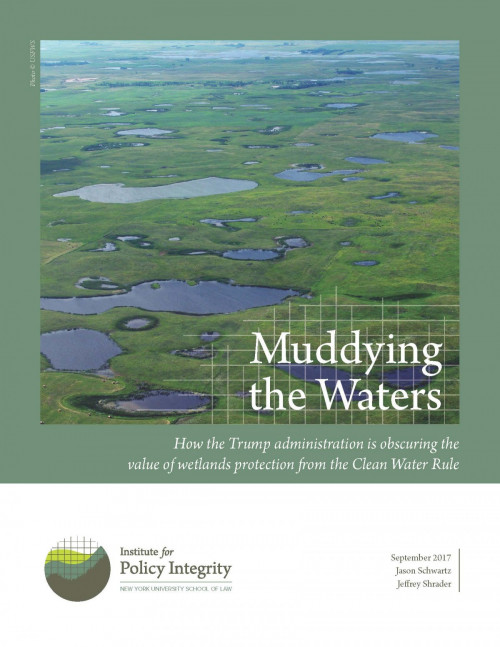
Muddying the Waters
How the Trump administration is obscuring the value of wetlands protection from the Clean Water Rule
In 2015, the Environmental Protection Agency and Army Corps of Engineers revised the definition of the “waters of the United States” as part of the Clean Water Rule. This revised definition was expected to increase the wetland area subject to protection under the Clean Water Act, and an economic analysis conducted by the agencies at the time showed that the benefits of the rule would substantially outweigh the costs. Under the Trump administration, the agencies now propose to repeal the 2015 Clean Water Rule and have issued a revised economic analysis in support of that decision. In the new analysis, the agencies now claim that the majority of the benefits in the 2015 analysis cannot be quantified, making it appear that the Clean Water Rule is not cost-benefit justified. The agencies have violated many of their own requirements for conducting economic analysis to arrive at this conclusion, and a more comprehensive assessment of the evidence shows that the 2015 Clean Water Rule is still cost-benefit justified. Repealing the 2015 Rule would forgo substantial environmental and economic benefits.
-
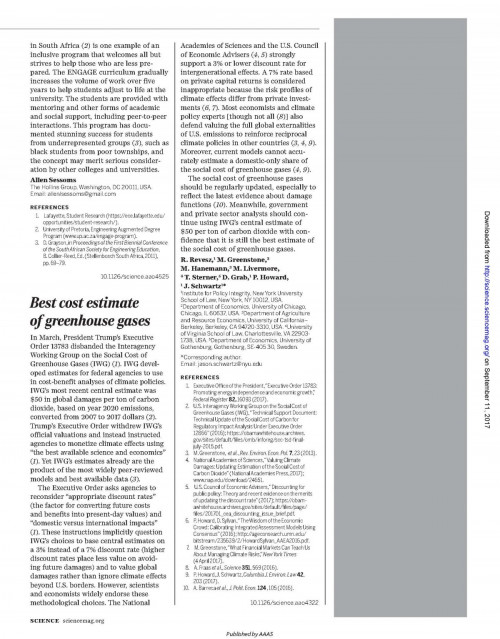
Best Cost Estimate of Greenhouse Gases
Despite the Trump administration’s decision to withdraw the official estimate of the Social Cost of Carbon and disband the interagency working group that developed it, a group of prominent economists and lawyers, including several Policy Integrity staff members, have highlighted the metric’s continued validity for policymaking in recent letter published in the journal Science.
-
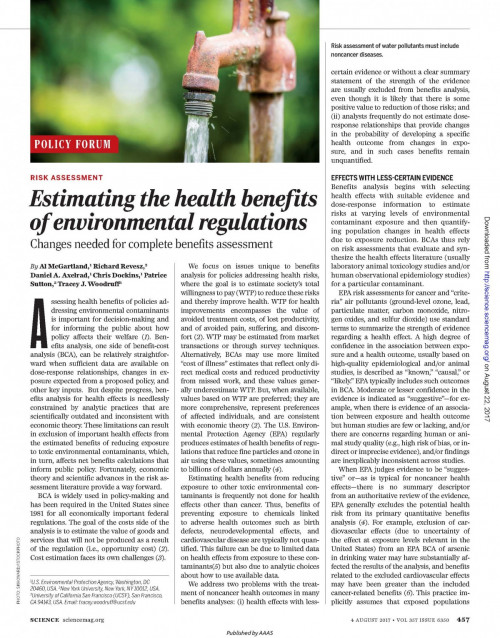
Estimating the Health Benefits of Environmental Regulations
Regulating toxic pollutants benefits society by limiting public exposure to harmful pollution. By accurately quantifying these benefits, policymakers can improve the design of regulations that protect public health and better communicate the magnitude of these protections to the public. A new article in the journal Science examines how this process can be improved.
-
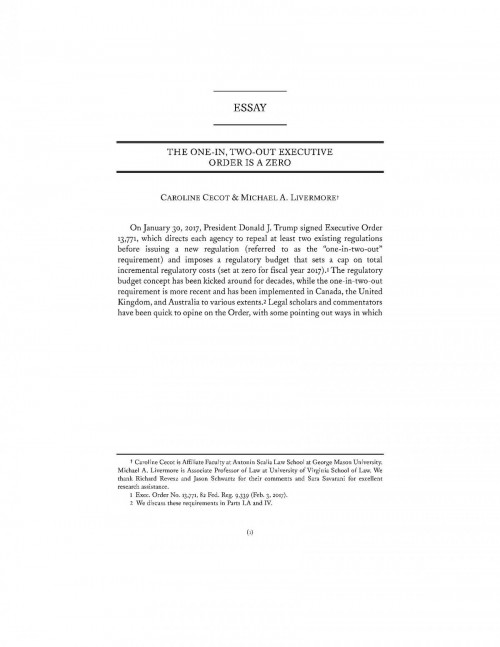
The One‐In, Two‐Out Executive Order Is a Zero
President Trump’s Executive Order 13,771 directs each agency to repeal at least two existing regulations before issuing a new one and imposes a regulatory budget that sets a cap on total incremental regulatory costs. In this essay, Caroline Cecot and Michael Livermore evaluate the Order against three priorities that have been adopted by prior administrations or promoted by scholars, commentators, or interest groups: (1) increasing net benefits of regulation, (2) decreasing regulatory burdens, and (3) increasing presidential control over agencies. They also compare the Order against the regulatory reform efforts in other countries.
The authors conclude that the Order is unlikely to achieve any of these goals without significant changes. They urge President Trump to scrap the Order and instead ensure that agencies engage in reasonable retrospective review of existing regulations and that the Office of Information and Regulatory Affairs has sufficient staff to oversee agency decisionmaking, among other sensible reforms.
-
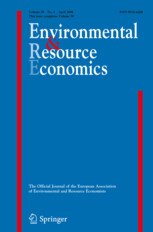
Few and Not So Far Between
A Meta-analysis of Climate Damage Estimates
Given the vast uncertainty surrounding climate impacts, meta-analyses of global climate damage estimates are a key tool for determining the relationship between temperature and climate damages. Due to limited data availability, previous meta-analyses of global climate damages potentially suffered from multiple sources of coefficient and standard error bias. To address and test for these biases, we expand on previous datasets to obtain sufficient degrees of freedom to make the necessary model adjustments, including dropping duplicate estimates and including methodological variables. Estimating the relationship between temperature and climate damages using weighted least squares with cluster-robust standard errors, we find strong evidence that duplicate and omitted variable biases flatten the relationship. However, the magnitude of the bias greatly depends on the treatment of speculative high-temperature (>4 ◦C) damage estimates. Replacing the DICE-2013R damage function with our preferred estimate of the temperature–damage relationship, we find a three- to four-fold increase in the 2015 SCC relative to DICE, depending on the treatment of productivity. When catastrophic impacts are also factored in, the SCC increases by four- to five-fold.
-
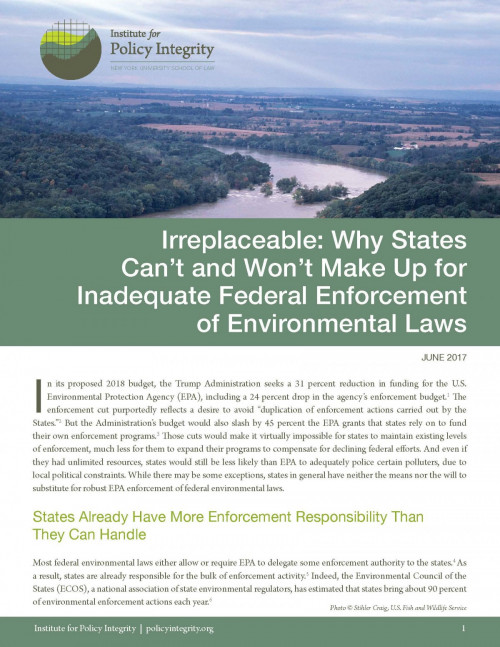
Irreplaceable: Why States Can’t Make Up for Inadequate Federal Enforcement of Environmental Laws
Budget cuts threaten EPA’s ability to enforce federal environmental laws, and states have neither the means nor the will to substitute for it. Our issue brief on EPA enforcement explores the financial and political constraints that state regulators already face when implementing federal environmental laws and how the Trump Administration’s budget cuts would exacerbate these problems.
-
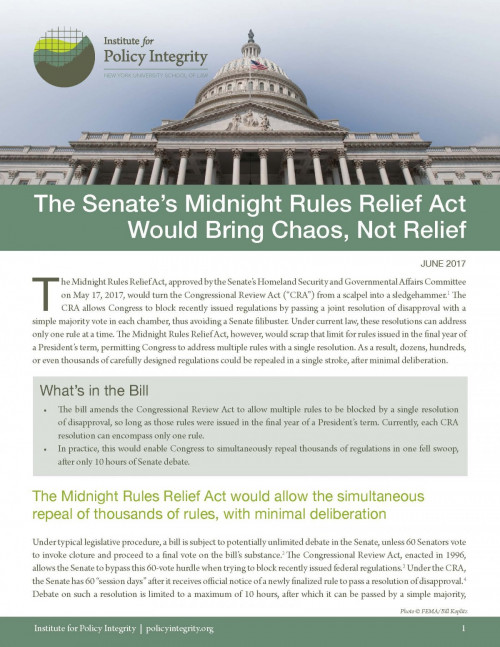
The Senate’s Midnight Rules Relief Act Would Bring Chaos, Not Relief
The Midnight Rules Relief Act, approved by the Senate’s Homeland Security and Governmental Affairs Committee on May 17, 2017, would turn the Congressional Review Act (“CRA”) from a scalpel into a sledgehammer. Our issue brief describes how this shift in regulatory policy would allow for quick repeals of public safeguards after only 10 hours of Senate debate and prevent similar rules from being enacted in the future.
-
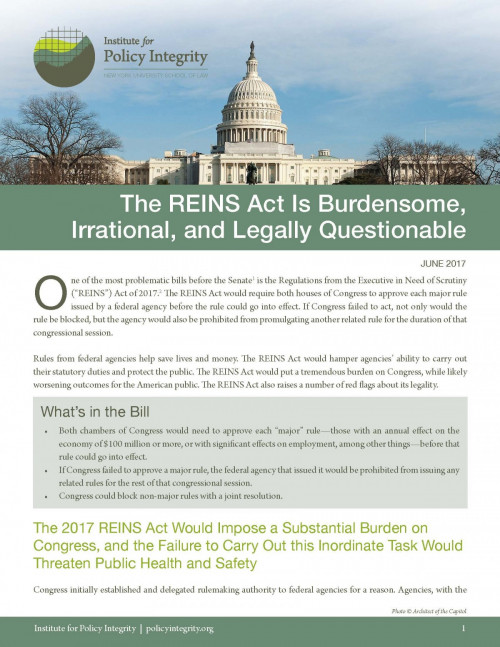
The REINS Act Is Burdensome, Irrational, and Legally Questionable
The Regulations from the Executive in Need of Scrutiny Act (“REINS Act”) would prevent agencies from issuing statutorily required rules unless approved by Congress. Our issue brief describes how this bill would create substantial burdens for Congress, worsen outcomes for the American public, and raise constitutional red flags by allowing Congress to repeal earlier statutes through inaction.
-
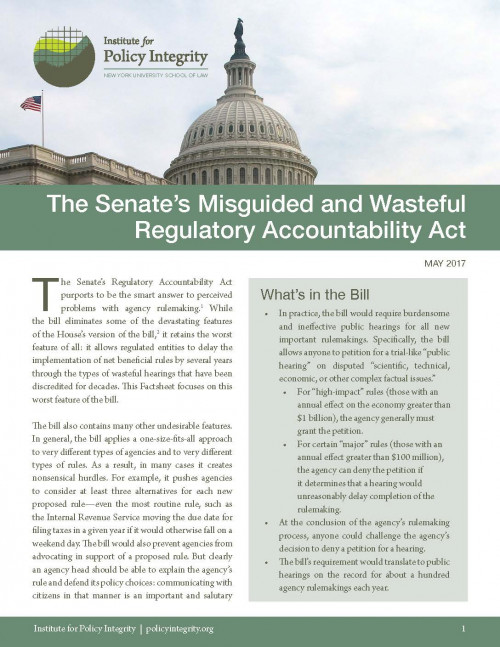
The Senate’s Misguided and Wasteful Regulatory Accountability Act
The Senate’s Regulatory Accountability Act would rewrite notice-and-comment rulemaking procedures and create extraordinarily burdensome hurdles in rule implementation by requiring trial-like public hearings. Our issue brief describes how this change to regulatory reform would give opponents of major public safeguards a valuable tool to delay implementation for years, without any regard to the harm that delay would impose on the health and safety of the American public.
-
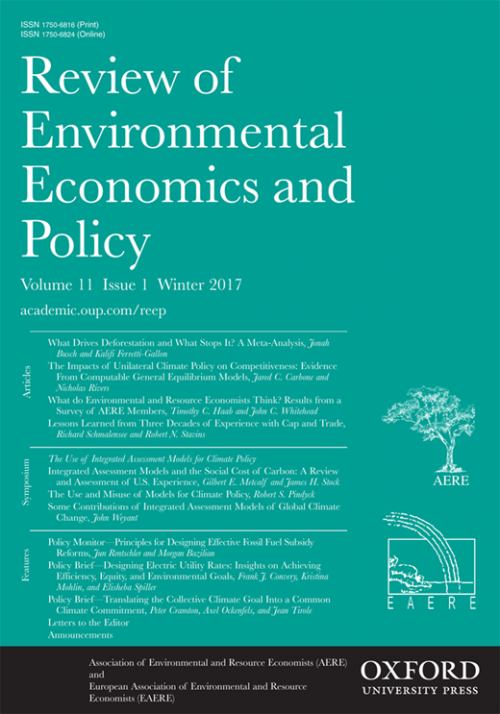
The Social Cost of Carbon: A Global Imperative
To solve the unprecedented global commons problem posed by climate change, all nations must internalize the global externalities of their emissions. If not, collective efforts will never achieve an efficient, stable climate outcome. The United States’ practice of looking at the global impact of emissions has come under attack in courtrooms and academic journals, with some arguing that the U.S. should instead consider only the domestic impacts of climate change in its decisionmaking.
In a letter published in Review of Environmental Economics and Policy, we argue that federal agencies should continue to use a global number for Social Cost of Carbon, as developed by the Interagency Working Group on Social Cost of Carbon. First, the United States benefits tremendously if other countries set policy based on global rather than local effects. From a legal perspective, not only does international law—the U.N. Framework Convention on Climate Change—commit the United States to account for global effects, but domestic laws like the Clean Air Act and the National Environmental Policy Act also either require or give discretion to agencies to consider global climate costs. Many seemingly “foreign” climate damages would actually spill over to harm the United States.
Viewing recent projects in Publications
